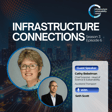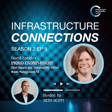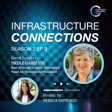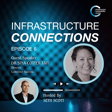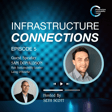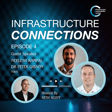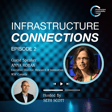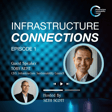Become a Creator today!Start creating today - Share your story with the world!
Start for free
00:00:00
00:00:01

Episode 3: The Australian Sustainable Finance Institute
Host Seth Scott discusses with Guest Speaker, Kristy Graham, CEO of the Australian Sustainable Finance Institute about her views on sustainable finance and her involvement in the Australian Sustainable Finance Roadmap, its importance in infrastructure investment, and how it impacts sustainable infrastructure.
Transcript
Podcast Introduction
00:00:00
Speaker
you'll get better long-term returns if you're looking at all of those risks that are likely to have an impact.
00:00:13
Speaker
Welcome to Infrastructure Connections, the podcast where we explore what makes sustainable infrastructure work brought to you by the Infrastructure Sustainability Council. I'm your host, Seth Scott, and today we'll be speaking about the Australian Sustainable Finance Institute with our guest, Christy Graham.
00:00:31
Speaker
Christy is the Chief Executive Officer of the Australian Sustainable Finance Institute, where she spent the last three years guiding the development and implementation of sustainable finance policy and regulation.
00:00:43
Speaker
working with financial institutions, government, regulators, and industry to support a sustainable, resilient, and inclusive Australia. Prior to that, she spent seven years at the Department of Foreign Affairs, leading private finance for climate and development.
00:00:58
Speaker
Hi, Christy. Thanks for joining the show. Thanks for having me. Great to be here. So, um just wanted to get started with a little bit about your background.
Christy Graham's Background & Inspiration
00:01:07
Speaker
ah What was the spark that inspired you to dive into sustainability in the first place?
00:01:12
Speaker
Well, I grew up on a farm in central western new South Wales on Wiradjuri country. And my dad was, um as as many farmers are, continually outside. we During the school holidays, we would um be forced labour on the farm. but But a big part of that was...
00:01:29
Speaker
um observing and and sort of keeping an eye on the natural environment that exists on that farm. There's a lot of remminant vegetation, there's platypus, echidna, there's kiddna said lot of wallabies, wombats.
00:01:40
Speaker
um And so through that process um developed a really deep appreciation and understanding of of the natural world and also the way that our economic systems, our society interact and and operate within that environment.
00:01:55
Speaker
And so I think it was that fundamental kind of understanding that humans are part of nature and reliant on natural systems for um food, fiber, all of our kind of daily needs that really sparked my um desire to to focus kind of career and um purpose in that area.
Understanding Sustainable Finance
00:02:16
Speaker
For people who are not as familiar with sustainable finance on a very high level, how is it differentiated from, i don't know how you'd call it, old-fashioned finance? ah So, sustainable finance is about the integration of sustainability-related risks, that could be climate, nature, social risks, into financial decision-making, um and as well as the integration of risks to support allocation of capital towards sustainability outcomes.
00:02:43
Speaker
Again, to capitalise on the commercial opportunities that that will bring, given the global shifts and and transformations that So, there's, at that basic level, integrating those issues into how financial decisions are made is enabled by policy and regulatory settings.
00:03:00
Speaker
um Often that information isn't readily available across the whole economy and policy settings like disclosures, like taxonomies, like labeling of financial products help make that information available to enable financial decisions to integrate that information.
00:03:16
Speaker
um The other part of sustainable finance is getting capital flowing more quickly to those sustainability outcomes. And catalytic capital or blended finance, often from government, sometimes from philanthropy, is a way of structuring to share risk between different parts of financial transaction and ultimately accelerate the flow of private capital towards those opportunities.
00:03:41
Speaker
But sustainable finance um at its very core, how is it different? It integrates those environmental, social and governance factors. Well, so if finance was an engine for change, as you've once said, what are the levers that it's pulling on? Where does it make the most impact on the system?
00:04:01
Speaker
Yes, the financial system essentially underpins economic activity. So, finance enables business activity if you think about the interactions um at the individual level as well. The financial system enables um things like ah you to to manage your risk through insurance products.
00:04:20
Speaker
It enables you to smooth kind of consumption and make big purchases like a house or a car. So, it enables activity in what we call the real economy.
00:04:32
Speaker
um So when you look at what finance, how finance can affect change, it can affect change right across the business sort of sectors.
00:04:43
Speaker
So it's not one particular sector that that finance interacts in. It can support transition or support the shift towards sustainability right across the system.
00:04:55
Speaker
and The other thing that I would mention in terms of the opportunities for finance um to affect change is through policy. And um we all know kind of the strong impact that policy settings on how business, how communities, how society operates.
00:05:14
Speaker
And financial institutions, because of their strong role in the economy, can play a pretty critical role in advocating for stronger policy that better aligns with sustainability
Evolution of Sustainable Finance
00:05:24
Speaker
outcomes. How have you seen over your career that sustainable finance has evolved? Where did it start and where is it going now?
00:05:33
Speaker
ah guess when I first started doing this work, it wasn't called sustainable finance. It was sort climate finance or it was um sustainability strategy in the corporate sector and climate finance was i a small subset essentially of – donor government funding to developing countries to support their climate transition or to support adaptation resilience.
00:06:00
Speaker
And I think in the last 15 years, but particularly in the last sort of seven or eight years, we've seen this huge expansion of sustainable finance and this huge – uptake of these concepts from just to think about how individual financial institutions right through to policy and regulation can be better integrating sustainability risks into the way decisions are made.
00:06:26
Speaker
So a couple of examples, the Network for Greening the Financial System was established in 2017, which is a network of central banks who are thinking about the um prudential risks or that the the way that climate and now other sustainability issues will affect and macro stability.
00:06:49
Speaker
So, that was not sort of conceived of. Climate was not, 20 years ago, not conceived of as a risk that financial sector regulators would not just think about but would actively put in place policy and regulation about um and that is very much sort of front and centre of some of the long-term risks that now 180 financial sector regulators around the world who are part of the Network for Greening the Financial System think about and act on collectively. The work of that group is also now moving beyond climate um to consider nature and the kind of systemic risk that nature loss poses.
00:07:28
Speaker
um to economies and financial systems in particular. So I guess that's one example of of the evolution. i think from the financial institution side, we're also seeing the evolution of sustainable finance from the integration of risks and long-term risks and and that being the domain particularly of long-term investors who are wanting to ins ensure because of the strong links between um long-term commercial returns and the integration of these risks and decision-making, we're seeing that they are increasingly also seeking to mitigate those long-term risks through allocation to solutions.
00:08:08
Speaker
um And we're seeing that happen kind of now through banking and insurance as well in the way that different parts of the financial system ah in an increasingly sophisticated way are Thinking about these issues and allocating capital towards these issues.
00:08:27
Speaker
It's good to see those risks expanding. I like to feel it makes me feel safer, really, that our financial establishments are considering additional risks and further defining what what more risks there are into the system.
00:08:42
Speaker
That's helpful. Yeah, and I think there's been some really important global initiatives and and global collectives that have helped to drive that expanded consideration. So, the Taskforce on Climate-Related Financial Disclosure back in 2015 started this idea that if you can understand and report on these risks, then you're better placed to manage them and then um Since then, the Task Force on Nature-related Financial dist works Disclosure has set up frameworks for doing that with nature and there's also now a Task Force on Inequality, again, global task force that's looking at the social-related risks. So, um we are seeing –
00:09:20
Speaker
like sort of technical work and global coalitions form around these risks to get more granular about how business and financial institutions can get a better handle on the sort of long-term financially material aspects of these risks.
00:09:37
Speaker
Yeah, that's excellent.
Institute's Role & Collaborative Efforts
00:09:38
Speaker
So how does the Australian Sustainable Finance Institute fit into that? What do you do and and why So we were established by Australian financial institutions, by some of Australia's largest banks, superannuation funds, insurance companies, financial services companies back in 2021.
00:09:56
Speaker
And many of them had been doing exactly what we're talking about, integrating sustainability risks into decision-making processes. We're increasingly wanting to allocate capital towards sustainability outcomes because of the commercial opportunities that they saw in that space.
00:10:14
Speaker
but recognise that that was difficult to do one by one or an individual basis. So ASFI was formed um by industry, but to work collaboratively with government, with regulators, with universities, with other industry organisations to push the sustainable finance system, both the market and the policy and regulatory settings, to enable greater allocation of capital towards those outcomes.
00:10:40
Speaker
When we were established, um there was not a government that had a strong sort of policy ambition around sustainable finance, but that quickly changed sort of within about six months of us being established. And so, for the last two and a half years, we've been in um an excellent position to um facilitate stronger partnership and collaboration with industry and government very much pulling in the same direction.
00:11:04
Speaker
um And that's enabled Australia really to catch up with international jurisdictions on the sustainable finance agenda. um We now have ah mandatory climate disclosures that's been legislated and reporting has started for the largest companies We've developed the sustainable finance taxonomy for climate mitigation criteria across six sectors that will be released in the middle of the year. There's a range of other sort of elements of government sustainable finance strategy that and was published in the middle of last year that are in various stages of progress. And I think we've also seen the market continue to kind of evolve and develop and and start to focus on some of these sustainability issues beyond climate as well.
00:11:47
Speaker
um So, to nature being an obvious one, First Nations, economic self-determination, another focus of our work. um But we were very much established to bring these different parts of industry, government and the broader system together to drive forward sustainable finance in the Australian.
Sustainable Finance Action Plan
00:12:10
Speaker
And I assume part of that is the just released Sustainable Finance Action Plan? That's right, yes. And um when sort of before we were originally formed in 2021, that was off the back of a collaborative but industry effort to develop Australia's very first sustainable finance roadmap.
00:12:30
Speaker
um yeah As I said, there's been lot that has lots of progress that has happened in the last three years and the work that we did on the action plan, again, bringing in industry, bringing in other partner organisations,
00:12:46
Speaker
really took stock of what has been achieved but also looked at the external context um and said, well, if we're to achieve our goal of a sustainable, resilient and inclusive financial system by 2030, what needs to happen in the next three years?
00:13:01
Speaker
um We know that that will be a really critical period for progress. um And so what are the things that industry sees as being critically important for the growth and credibility of sustainable finances?
00:13:13
Speaker
So that action plan was released, as you mentioned earlier this year, off the back of what was a very collaborative process over the last six months of last year. And it does a few things. It crystallises the particular outcomes that many of the actions that have been identified ah supporting. So climate mitigation, um climate adaptation resilience,
00:13:37
Speaker
um nature outcomes, First Nations outcomes and community resilience outcomes as well. So it eat puts in place now a framework where it's clear what real-world outcomes the financial system should be supporting. And then pulls out a number of priority action areas that are needed in the next three years to achieve better outcomes and and the financial system can contribute to. So...
00:14:08
Speaker
In terms of those priority action areas, there's one around sustainable finance policy and regulation, so that's sort of financial sector regulation. There's national targets, plans and policies, again, covering climate but also covering broader environmental and industrial policy. There's policy settings being really important to channel capital.
00:14:27
Speaker
There's one on data and reporting and data kind of continually comes up as an enabler of better progress on sustainable finance. there's another set of actions around financial innovation and recognising that um the financial system and the products and the way that products are structured ah needs to continue to innovate to achieve the outcomes that are identified as well as the leadership and culture within financial institutions
00:14:58
Speaker
right down to purpose but then flowing through through the the way that the whole organisation is sort of established and and set up and incentivised to achieve those sustainability objectives. There's another group of actions around capability and that's capability not just within the finance sector but also in in the public sector and and within the finance sector to better partner and better collaborate because it's come out very strongly through our work. Is that sort of a critical enabler of progress on all of this as well?
00:15:32
Speaker
um And the last bucket of actions is around the international engagement. As I mentioned, Australia has caught up relatively quickly. We're now in a position where many other jurisdictions are seeking to learn from that experience.
00:15:43
Speaker
um And obviously, capital markets are global and so there's a need to align with sustainable finance markets and um policy and regulation in other key jurisdictions for Australia as well.
00:15:58
Speaker
That sounds like a lot of work. Yeah, and and just to be clear, that's not just actions for ASFI. This is sort of things that need to happen across the financial system. So I guess a key role that we play is as a coordinator and convener of of the activity that's happening by many, many organizations, all of whom were sort of part of this process. And so this is not just our to-do list. This is a collective um industry and government um and partner organization to-do list. So, yeah, looking forward to kind of getting stuck in with with many other partners on that list.
00:16:33
Speaker
That makes sense.
Supporting First Nations Economic Self-Determination
00:16:35
Speaker
um One of the other areas of focus that was really interesting, I thought, was your First Nations economic self-determination. We've seen that in infrastructure and renewable energy companies have started to pick up on that, um giving First Nations equity or joint ownership.
00:16:50
Speaker
Tell us about your First Nations projects group. What are you seeing in that space? Yeah, and this was right from the very original roadmap, a really strong theme that came through and something that um the finance sector can play a key role in supporting economic self-determination of First Nations Australian.
00:17:11
Speaker
The work that um we've done so far, so the partnership with First Nations Projects Group, First Nations Projects Group is an Indigenous-owned-led organisation and we're partnering with them to scope, develop and incubate a First Nations major projects coalition for Australia.
00:17:30
Speaker
So, that would be a national organisation to support traditional owners and industry in negotiating partnerships for major projects that impact First Nations people and their traditional lands. So, as I said, there's um ah a number of examples now where traditional owners have negotiated equity stakes in projects and this is very much the future of partnerships for large companies or any companies operating and working with um First Nations communities.
00:17:58
Speaker
What we are seeing is that there is um not the ability at the moment for that information and learning to be shared across communities and to be shared across the corporate sector as well because there's um not necessarily the connection or the ability to translate what's happened in one setting to inform and accelerate that agreement-making process in another context.
00:18:25
Speaker
So, at the moment, um it's in early stages of scoping that work, but I think the Canadian experience and the First Nations Major Project Coalition in Canada has been going now for 15 years and has been really successful in being able to draw lessons, build connections, build capability and ensure that First Nations communities have access to both technical, legal, financial capability um to be able to negotiate partnership agreements that set them up well for the long term um and the discussions that we've had um with community and with a range of different stakeholders, including corporates and financial institutions, is that that function would be incredibly valuable in the Australian context, given we know that um the –
00:19:14
Speaker
renewable energy transition, whether that's transmission, whether that's generation, will need to happen on First Nations land. Similarly, there is a huge need for ah critical minerals. Australia is really well placed to to provide critical minerals to support the transition globally.
00:19:31
Speaker
um A lot of that extraction and then processing, again, will happen on First Nations land. So how do we use this opportunity of the transition to really also support um economic self-determination for First Nations Australians as well.
00:19:50
Speaker
Yeah, that Canadian model is is such a boon to have as ah as a precedent. It's really going to help us, I think. Yeah, and and I guess that's been a function of how we've gone about lots of our work in Australia. Coming to the sustainable finance agenda, I would say, not at the front of the pack, has been a huge advantage and we've really been able to piggyback on the generosity of international partners, whether they be from Canada, from the EU, from Indonesia, from Singapore.
00:20:20
Speaker
to try and um to enable us to avoid some of the speed humps that they've had. and And similarly, we're now doing that with other jurisdictions who are thinking about, you know, green standards for the mining sector, for example, which we've done a lot of work on through the taxonomy. So these international partnerships will continue to be a really valuable part of how we work.
00:20:44
Speaker
And you've had a lot of exposure to those international partnerships as well. Even last year in COP29, you're in Baku for a panel. What's the international mood out there around sustainable finance?
International Collaboration in Sustainable Finance
00:20:55
Speaker
How much is it being embraced internationally?
00:20:58
Speaker
Yeah, so that I guess COPs are an interesting... and two-track process, if you like. There's the negotiations track and then there's the climate um fair or trade fair, shall we say, um the negotiations. There was a lot of um media interest and broader interest in the climate finance negotiations, which australia the Australian government played a really strong and integral part in landing a deal.
00:21:28
Speaker
um There were points during the negotiations that it wasn't clear that that would be able to be landed and so sort of incredible work by um the Australian negotiators and sort of the the broader team there, we were there very much for the the action agenda and and to be understanding and interacting with peers and colleagues on what was happening on the ground and how financial regulators, how financial institutions, how business was moving ahead with the agenda um in some senses regardless of of the negotiation outcomes. So, we're involved in a range of different um panels and other discussions that looked at um the policy and regulatory settings that many countries are bringing in. So, things like taxonomies, which help to define what is considered green or what is considered transition in different jurisdictions, and particularly how they're starting to be harmonized across different areas.
00:22:23
Speaker
jurisdiction um Ultimately, and financial markets are global and so you want as much harmonisation and alignment as is possible to support that global flow of capital. So i would say the mood was with fairly buoyant. there's There's a lot of activity happening at the national level.
00:22:41
Speaker
That was obviously at a point where it was clear that the US would be pulling out of the Paris Agreement. But the very strong feel um and in the action agenda discussions was there are still very large investors, very large banks, um very large financial institutions that remain committed to net zero 2050.
00:23:00
Speaker
um whether or not they they remain committed to to global alliances is sort of a different question as to whether they remain committed to working with their clients and to um meeting their own internally set targets. And it's always interesting to unpack the difference between that those two things. I think we're now seeing – the US headquartered banks pulling out of Net Zero Banking Alliance, all of those banks actually have lawsuits filed against them um by various US states. And so there's a very real legal risk that they need to manage.
00:23:38
Speaker
um They will, all of you, kind of tell them that that doesn't change their commitments or their strategy or how they will go about supporting this transition of their clients. So I think the The action agenda part of COP is always a great reminder of kind of the momentum and the weight of action that is happening regardless of and sort of political noise in a range of jurisdictions.
00:24:03
Speaker
Do you see that as inevitable at this point? I mean, even with that kind of turbulence in the system, you're still seeing in general the international markets moving in the right direction?
Future of Sustainable Finance
00:24:14
Speaker
Sure.
00:24:14
Speaker
Absolutely. And I think the reason for that comes down to commercial fundamentals. um And the reason that people started integrating sustainability-related risks into their financial decision-making and allocating towards opportunities was entirely commercial.
00:24:32
Speaker
You'll get better long-term returns if you're looking at all of those risks that are likely to have an impact. on um the returns of that investment portfolio or that investment opportunity and the commercial fundamentals haven't changed.
00:24:47
Speaker
um So I think that is very clearly the direction of travel and there's also a short-term versus long-term time horizon too. Residential terms are ah relatively short if you're ah ah superannuation investor and you're looking at kind of a 30, 40, 50-year time horizon.
00:25:07
Speaker
I see you laugh. if your Four years can feel long, but I think in the in the broader scheme of things, there's there's much more long-term thinking that exists within the financial system. Yeah, absolutely right, especially if you're getting at fundamentals.
00:25:20
Speaker
So um what do you see over the next 10, 20, 50 years for sustainable finance? Where is it going and what do you think the next next big thing is? Yeah, so I think we'll continue to see this expansion in terms of um issues that are integrated into decision-making. So climate, obviously, a huge focus.
00:25:42
Speaker
I think there has been much more of a focus on transition risk rather than physical risk score or um i think we'll see an increasing focus on adaptation and resilience given the level of warming that has now been locked into the system. um and so particularly for long-term investors in in real assets like infrastructure, um we're seeing many of our members focusing much more on the resilience of
00:26:14
Speaker
given climate scenario projections over the next kind of 10, 20, 30 years. So I think we'll see sort of doubling down on focus on that within the climate space. I think nature is an issue that lots of organisations have started to understand and started to unpack.
00:26:32
Speaker
um Regulators, as I mentioned, are also thinking about nature and how they can encourage markets to make available that information to use in decision-making around nature.
00:26:47
Speaker
And again, i think some of the social-related risks have, um you know, there's been pockets. So, some modern slavery is is something that but regulation has driven the consideration of in a number of markets.
00:27:00
Speaker
But more broadly, there are changing community expectations around things like education First Nations rights and heritage and the need for but companies um and financial institutions to support better partnerships and more equitable partnerships.
00:27:17
Speaker
and So I think we'll see the social side very much starting to evolve but also be more become more standardised in the way that climate and nature...
00:27:28
Speaker
is becoming as well because once you have tools and frameworks um and that standardisation, it becomes much more mainstream and and there's the ability for that to be integrated as part of financial institution processes.
00:27:43
Speaker
So you're saying in the long term, in the short and long term, sustainable finance is here to stay and it's only going to become more important? I think so and and because...
00:27:54
Speaker
yeah those commercial realities of um when these risks are not integrated and are not therefore mitigated and managed will continue to, I guess, show up in the returns of of portfolios or the returns from or the risk profile of particular clients if you're a bank. so So I think there will, that commercial rationale and driver will only kind of increase.
00:28:29
Speaker
So um what about people who aren't necessarily in finance or who would like to see this the sustainable finance succeed but maybe not are directly involved in it?
00:28:40
Speaker
and what do you think one thing that and What do you think is one thing that they can do to help promote sustainable finance, whether it's demand it or practise it, specify it, and encourage it to be regulated?
Supporting Sustainable Finance as Individuals
00:28:51
Speaker
So I think at the individual level, um you can demand it. So does it talk to your financial advisor, ask your super fund, um be sort of an active consumer of financial products and if your preference are to align your financial products.
00:29:08
Speaker
with those values, then make sure um the institutions that you are purchasing from understand that and that you're choosing products that align with that. I think we've seen sort of an explosion of financial products that have to to varying degrees kind of integrating consumer preferences for sustainability.
00:29:28
Speaker
um So, at the individual level, absolutely kind of demand that and expect that from the financial services that you are purchasing. And then I would say within people's organisations, um sustainable finance is an excellent way to elevate and accelerate the sustainability transformation of organisations because you then have not just an internal sustainability team but you have your internal treasury function and CFO function reporting on a sustainability strategy and its implementation.
00:30:00
Speaker
If you have a um sustainability link loan or you've issued a sustainability um bond. So at the corporate level, i would encourage people to um see it as an opportunity to accelerate and enhance the sustainability strategy of the organization as well.
00:30:20
Speaker
And this has been a great interview. Thank you so much. Thanks very much for having me. It's been great having a chat.
00:30:27
Speaker
Thank you for listening to Infrastructure Connections. Please take a moment to follow us wherever you get your podcasts. And we want your feedback. Drop us a line to let us know what you think. Stay tuned for the next episode where we talk to Dr. Peter Gibson and Neelish Rampal about how AI and physics create high-resolution climate projections.
00:30:46
Speaker
That's coming up next on Infrastructure Connections.
